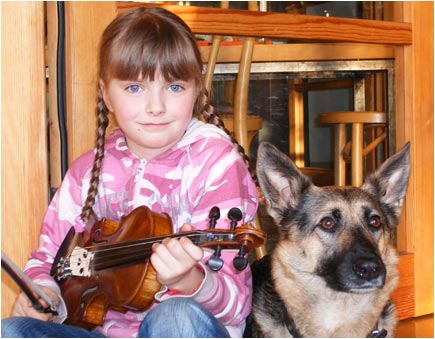
|
Kein aktuelles Interview, sondern drei Filmchen gibt's bei Youtube zu sehen:
Di Chuzpenics live in Buxtehude am 19. Mai 2012 mit Drej drejdl und Kol dodi (beide Stücke sind übrigens auf unserer fünften CD "glat asoj" in Studioqualität zu hören, und Drej drejdl ist auch als Hörprobe auf der CD-Seite abrufbar!). Und Di Chuzpenics mit Daniel Weiss als Gast live im Kröker im Kieler Aubrook 100 mit der Maschke (dieses Stück findet sich auf unserer CD "tsulib maschke" und ist hier ebenfalls als Hörprobe abrufbar!). Wie bei allen Links von unseren Seiten können wir auch hier selbstverständlich keine Haftung für die Inhalte der verlinkten Seiten übernehmen. ---------------------------------------------- Radiobeitrag von Jantje Schwarz, gesendet am 5. April 2007, im WDR5 "Lilipuz. Radio für Kinder" Zur Zeit leider nicht mehr abrufbar! In diesem Beitrag war Lovis so freundlich zu erklären, was Di Chuzpenics so sind und machen. Auch Hexe hat uns wie immer tatkräftig unterstützt.  Lovis und Hexe (Mach's gut, Kleine!)
Und fast schon historisch...
Radiobeitrag von Frauke Schäfer, gesendet am 28. Oktober 1999 auf NDR1, Welle Nord, "Von Binnenland und Waterkant" MP3, 24 kbps, 724 KB
Radio interview with the band by Frauke Schäfer on NDR1 (North German Radio) from October 29th 1999 Music: Di Saposhkelach: Farkojfn di saposhkelach un furn af di droshkelach - abi mit dir in enjem tsi san Frauke Schäfer (interviewer): It's gotta be love. He'd sell his boots, sleep without a pillow or do without a table to eat on, in order to save the money to ride in a coach with his beloved. This piece, performed by Di Chuzpenics, was recorded during a concert in Cracow, Poland. A legendary concert: The Kieler band had to get up at three in the morning after a gig in Leipzig, Germany. They were on the road for thirteen hours and arrived only half an hour before showtime. The bassist, Kay Krügel remembers fondly anyway: Kay Krügel: In the long run, it was one of the most beautiful concerts I've ever played. It was a very moving experience for me because it was the first time I felt the audience could really identify with the music so much that they were in tears. It was totally fascinating for me because there were elderly people in the audience who were imprisoned in Auschwitz and our music was a part of their lost homeland. Frauke Schäfer: Fascinating and, at the same time, burdensome. That was Kay Krügel's feelings playing for Shoah survivors. Klezmer music is not a form of dealing with Germany's past, di Chuzpenics all agree fully on that point. The band members play klezmer muusic because it is so diverse and versatile. Klezmer music is influenced by a broad scope of different sources Christine v. Bülow explains: Christine v. Bülow: Klezmer music survived the Shoah. It is a living entity. We certainly don't play 'historical' music. Klezmer music is a tradition that has survived in many different and unbelievable corners of the world. We play klezmer today with that point in mind and klezmer is just the right music for us to express ourselves creatively. Every one of us in the band used to play completely different music and each person brings a little of that into the band. Music: Chusan, Khale, Mazel Tov Frauke Schäfer: Happy, melancholic, serious and even silly, the music of Eastern European Jews, was spread throughout the world and this development was hastened by the Nazis, especially in America. That's where Daniel Weiss grew up. Daniel Weiss: I'm the only one in the band who's Jewish, so the music is a part of me and my identity. I've known the music since I was a child. My grandparents were immigrants from Eastern Europe and this kind of music was at celebrations, like bar-mitzvahs. Frauke Schäfer: Daniel Weiss gave the group their name. Chutzpah, meaning 'unmitigated gall or nerve'. The 41 year-old explains that his grandparents spoke Yiddish when they didn't want the grandchildren to understand what was being said. Some of it sank in. Daniel Weiss has lived in Kiel for 18 years. He began playing klezmer two years ago and was a founding member of the group. It is very important to him that Yiddish music is played in Germany. Daniel Weiss: This music is just as German as Schiller or Goethe. It is a part of this culture just like Beethoven. Yiddish is derived from Middle Hochdeutsch and that's the reason a lot of people (in Germany) understand a good deal of the lyrics we sing. You have to keep that in mind. Frauke Schäfer: None of di Chuzpenics actually speak Yiddish, but after two years of playing klezmer music, the band members have come to understand it quite well. Many of the lyrics have been handed down in an oral tradition, although some have been written down and published in books and on record covers. That's why di Chuzpenics can't always count on finding the lyrics in books. Christine v. Bülow: Some of the material we go by listening to some scratchy, old recordings adn we're happy when we do find some lyrics written down somewhere. We can compare our versions and we correct the ones we never really got completely. It's nice not to have to contemplate every line and ask ourselves, what it could possibly mean? Frauke Schäfer: Di Chuzpenics play all over, from the Jewish community in Kiel, to private parties, cultural centers, bars and clubs. Their CD that came out in August, 1999 is comprised of different tracks, recorded on the road in the spring of 1999. The band's experience is that klezmer music attracts a diverse audience: people of all generations and walks of life; from politicians to punks. |